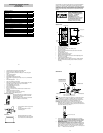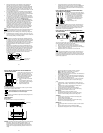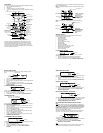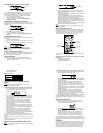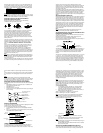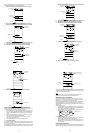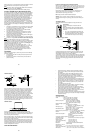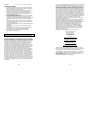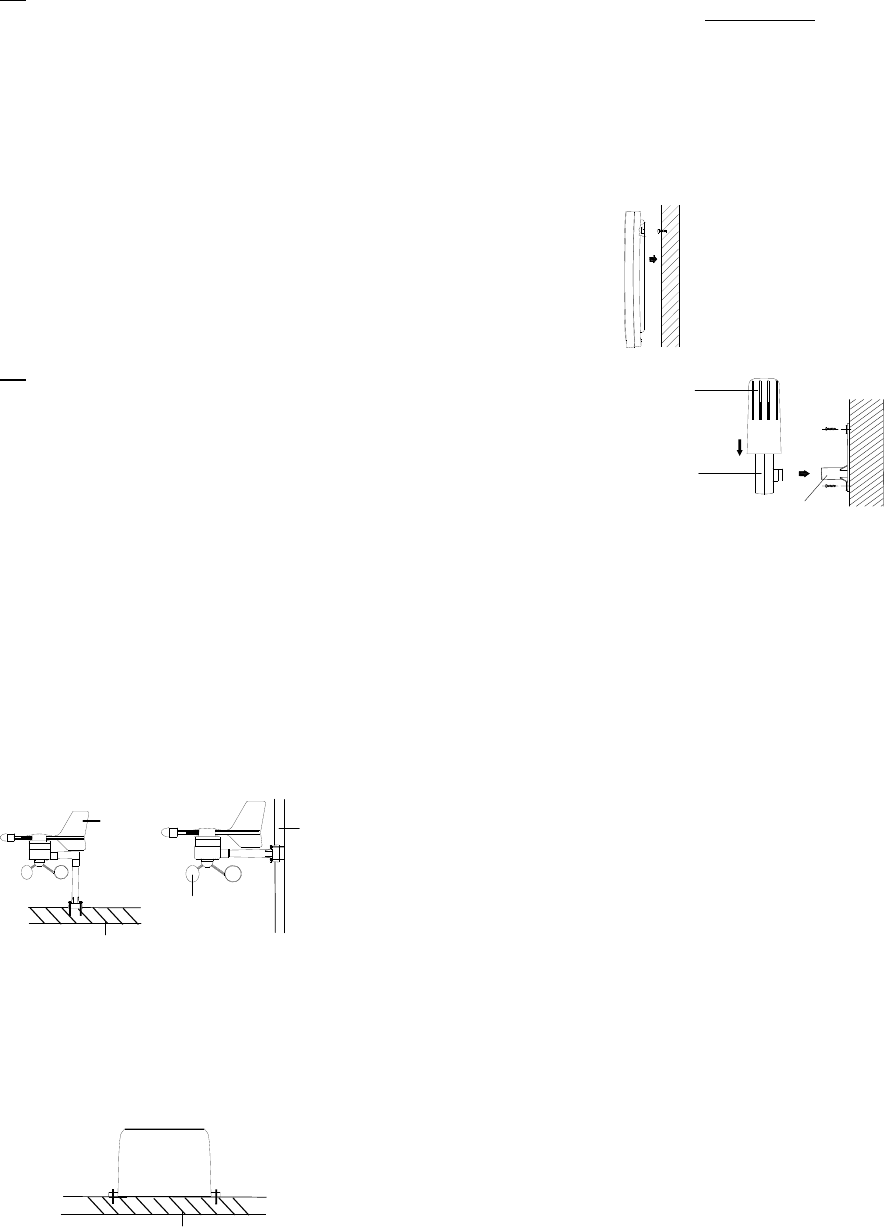
96
battery power is low. It is recommended to replace the batteries in all units
on an annual basis to ensure optimum accuracy of the system.
Note:
• After battery change, both the Weather Station and the transmitters
need to be reset (see note ”Setting up”)
• The History data record will be clear after the battery change.
OUTDOOR TRANSMITTER 915 MHz RECEPTION CHECK
The outdoor temperature, humidity, wind data are transmitted from thermo-
hygro transmitter every 4.5 seconds; the rainfall data are transmitted from
the rain sensor every 6.25 seconds. The receiver will be synchronized to
the thermo-hygro transmitter and rain sensor then. The transmission range
(supposedly up to about 330 feet /100 meters) of the thermo-hygro
transmitter/ rain sensor may be affected by the ambient temperature. At
cold temperatures, the transmitting distance may be decreased. Please
keep this in mind when placing the transmitter and the rain sensor.
If (1) the outdoor data are not being received within first several minutes
after setting up; (2) the outdoor display always show “- - -“ on the outdoor
display; or (3) the reception icon of thermo-hygro transmitter (Mode 1) and
rain sensor (Mode 2) is not displayed on the display, user shall check the
following points:
1. The distance of the Weather Center or transmitter/ rain sensor should
be at least 5 to 6.5 feet (1.5 to 2 meters) away from any interfering
sources such as computer monitors or TV sets.
2. Avoid positioning the Weather Center onto or in the immediate
proximity of metal doors or window frames.
3. Using other electrical products such as headphones or speakers
operating on the same signal frequency (915 MHz) may prevent
correct signal transmission and reception.
4. Neighbors using electrical devices operating on the 915 MHz signal
frequency can also cause interference.
5. “Visibility” of weather center and transmitters (e.g. through a window)
increases the range. (Delete, b/c Windows often reflect the signal)
Note:
When the 915 MHz signal is received, do not re-open the battery
compartment cover of either the transmitter/ rain sensor or Weather Center,
as the batteries may spring free from the contacts and force a false reset.
Should this happen accidentally then reset all units (see Setting up above)
otherwise transmission problems may occur.
During normal operation, after the outdoor display shows "- - -", the
weather center will change to receive the outdoor data every 15 minutes,
until the data is read. Then the reception period for thermo-hygro
transmitter will return to 4.5 seconds (6.25 seconds for rain sensor).
If no reception is possible despite the observation of these factors, all
system units have to be reset (see Setting up).
POSITIONING:
Prior to permanently affixing any of the units, please ensure the following
points are considered:
• Cable lengths of the units meet with your distance requirements at
the point of fixing
• Signals from the sensors can be received by the base station at
points of mounting
97
La Crosse Technology Sensor Extension Cable
When you require additional length to properly mount your sensor, you can
use La Crosse Technology extension cable. The extension cable is 32 feet
in length and comes with the appropriate connecter attached. Please visit
your local retailer or www.greatbigoutlet.com
to purchase.
Phone cables and connections have much more resistance than our
extension cable and are not recommended for use. Using phone
cable/connection may damage your sensors.
Note: Using extension cables will shorten battery life.
Warning: Never cut, splice, shorten or modify your sensor cables or
extension cables. Doing so may damage your sensors and will void your
warranty.
The Weather Center
The Weather Center has been designed to be hung onto wall or free
standing.
To wall mount
Choose a sheltered place. Avoid direct rain and
sunshine.
Before wall mounting, please check that the outdoor
values can be received from the desired locations. To
wall mount:
1. Fix a screw (not supplied) into the desired wall,
leaving the head extended out the by about 5mm.
2. Hang the station onto the screw. Remember to
ensure that it locks into place before releasing.
The Thermo-hygro Sensor
An ideal mounting place for the thermo-hygro sensor would be the outer
wall beneath the extension of a roof, as this will protect the sensor from
direct sunlight and other extreme weather conditions.
To wall mount, use the 2 screws to affix the wall bracket to the desired wall,
plug in the thermo-hygro sensor to the bracket and secure both parts by the
use of the supplied screw and ensure that the cables from the wind and
rain sensors are correctly plugged in otherwise data transmission errors
could occur.
Rain Cover
Main nit
Wall Bracket
98
The Wind Sensor
Firstly, check that the wind-cups and the wind-vane can rotate freely before
fixing the unit. For correct and accurate readings, it is important to mount
the sensor so that the front (marked E) is pointing in East-West direction.
The wind sensor should now be mounted using the screw or cable tie
provided onto a solid wall/ panel mast or mast to allow the wind to travel
around the sensor unhindered from all directions (ideal mast size should be
from diameter 0.62” to 1.29” (16mm to 33mm). Do not over tighten.
Once the wind sensor is fixed onto the mast, connect the cable to the
corresponding thermo-hygro sensor socket so that operating power supply
can be received and data can be transmitted to the base station. Secure
cord from blowing. Do not us staples. Using PVC pipe or metal as a mast
may cause static. Wood is recommended.
The Rain Sensor
For best results, the rain sensor should be securely mounted onto a
horizontal surface about 39.37” (1 meter) above the ground (or higher) and
in an open area away from trees or other coverings where rainfall may be
reduced causing inaccurate readings.
When securing into place, check that rain excess will not collect and store
at the base of the unit but can flow out between the base and the mounting
surface (test by pouring clean water).
After mounting the rain sensor and placing battery, the rain sensor is now
operable. For testing purposes, very slowly pour a small amount of clean
water into the rain sensor funnel. The water will act as rainfall and will be
received and displayed at the base station after about 2 minutes delay i.e.
when the reading interval is reached.
CARE AND MAINTENANCE:
Vertical
mast
Wind fan
Horizontal
panel
Wind
vane
Horizontal panel
99
• Extreme temperatures, vibration and shock should be avoided as
these may cause damage to the unit and give inaccurate forecasts
and readings.
• Precautions shall be taken when handling the batteries. Injuries,
burns, or property damage may be resulted if the batteries are in
contact with conducting materials, heat, corrosive materials or
explosives. The batteries shall be taken out from the unit before the
product is to be stored for a long period of time.
• Immediately remove all low powered batteries to avoid leakage and
damage. Replace only with new batteries of the recommended type.
• When cleaning the display and casings, use a soft damp cloth only.
Do not use solvents or scouring agents as they may mark the LCD
and casings.
• Do not submerge the unit in water.
• Special care shall be taken when handling a damaged LCD display.
The liquid crystals can be harmful to user's health.
• Do not make any repair attempts to the unit. Return them to their
original point of purchase for repair by a qualified engineer. Opening
and tampering with the unit may invalidate their guarantee.
• Never touch the exposed electronic circuit of the device as there is a
danger of electric shock should it become exposed.
• Do not expose the units to extreme and sudden temperature changes,
this may lead to rapid changes in forecasts and readings and thereby
reduce their accuracy.
SPECIFICATIONS:
Temperature measuring range:
Indoor : 32°F to +140°F with 0.2°F resolution
0ºC to +59.9ºC with 0.1ºC resolution
(“OF.L” displayed if outside this range)
Outdoor / dew point : -40°F to +140°F with 0.2°F resolution
-40ºC to +59.9ºC with 0.1ºC resolution
(“OF.L” displayed if outside this range)
Relative humidity measuring range:
Outdoor : 1% to 99% with 1% resolution
(“- -” displayed if < 1%, "99" displayed if ≥ 99%)
Wind speed/ gust : 0 to 111.8 mph (0 to 50 m/s)
(displayed "OF.L" when > 111.8 mph; 50m/s)
Wind chill/ dew point: -40°F to +140°F (-40ºC to +59.9ºC)
(displayed "OF.L" if outside this)
Relative pressure pre-set range : 27.17 to 31.90 inHg (919 to 1080 hPa)
Rainfall : 0" to 393.6" (0 to 9999 mm)
(displayed "OF.L" when > 9999mm)
Outdoor data reception : every 4.5 seconds (from thermo-hygro
transmitter)
every 6.25 seconds (from rain sensor)
Air pressure checking interval: every 15 seconds
Transmission range : up to 330 feet (100 meters) in open space
Power consumption:
Weather Center : 3 x AA, IEC LR6, 1.5V
Thermo-hygro transmitter : 2 x AA, IEC LR6, 1.5V
Rain sensor : 2 x AAA, IEC LR3, 1.5V
Battery life : approximately 24 months (Alkaline batteries
recommended)
Dimensions (L x W x H):
Weather Center : 6.15” x 1.25” x 5.58” (165.4 x 31.8 x 141.9mm)
Thermo-hygro transmitter : 2.25” x 2.44” x 6.18” (57.3 x 62 x 157mm)
Wind sensor : 9.84” x 5.74” x1087” (250 x 145.9 x 276.2mm)



